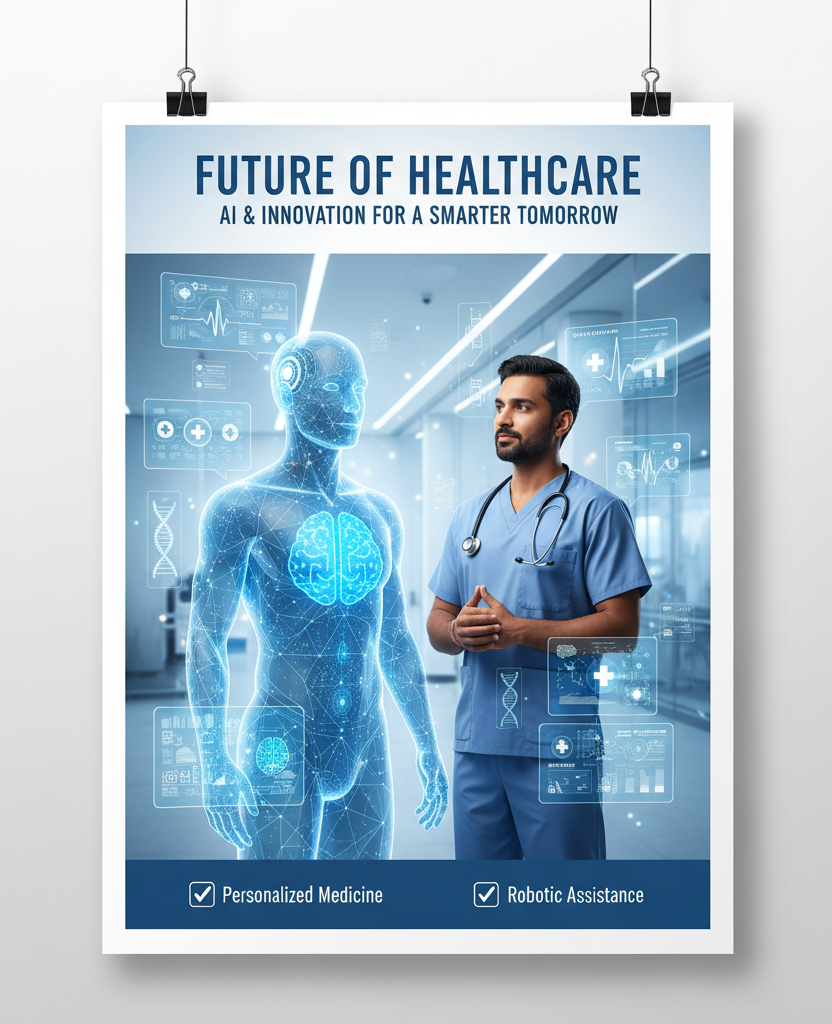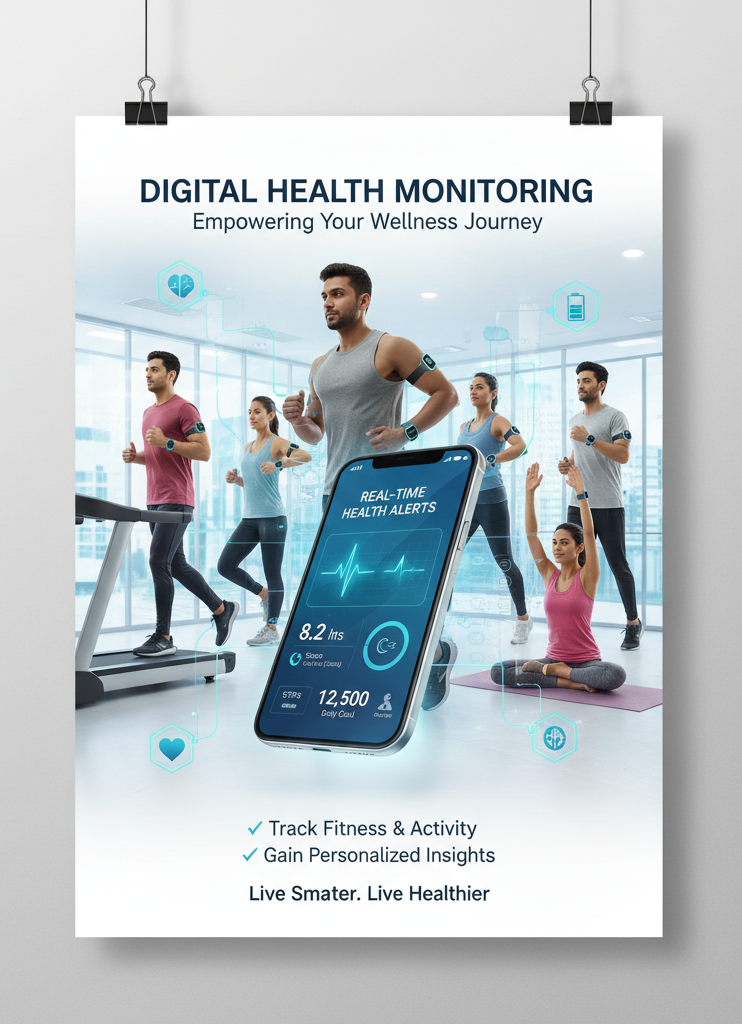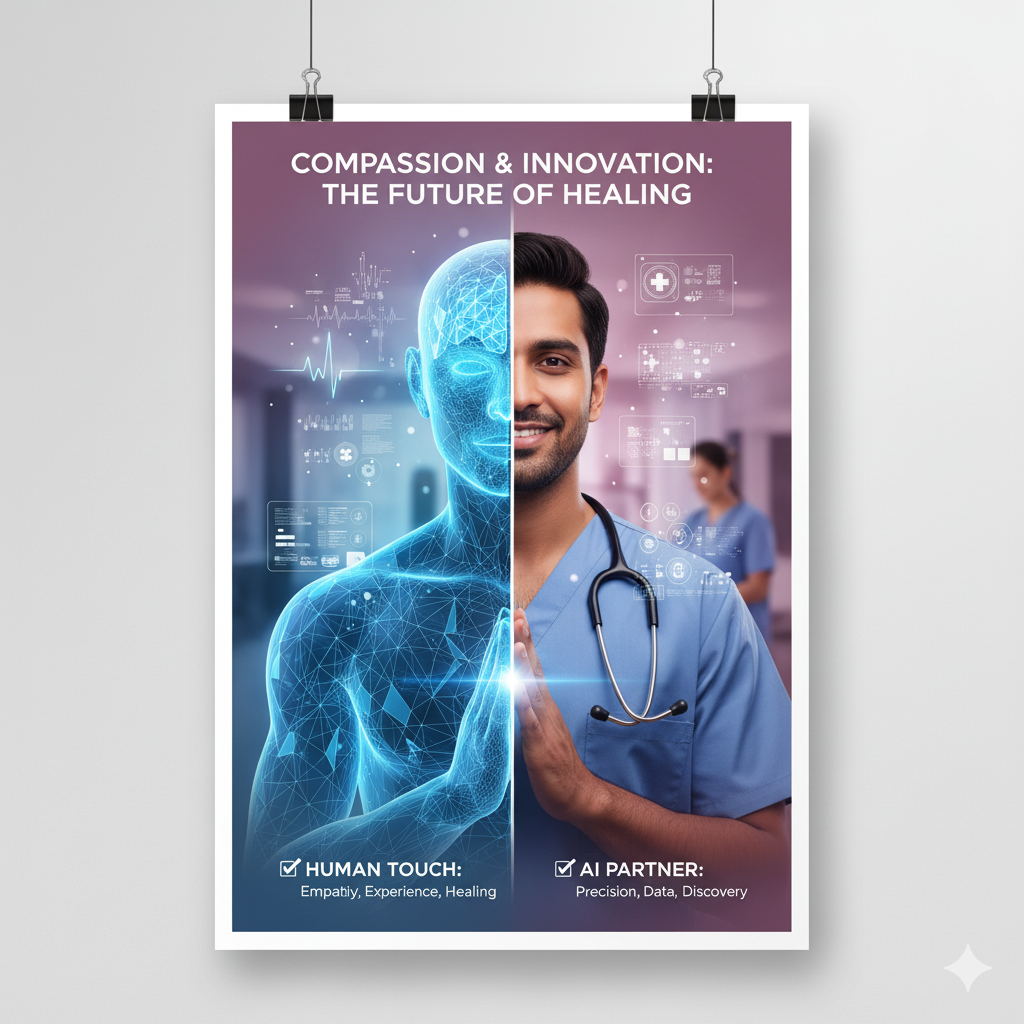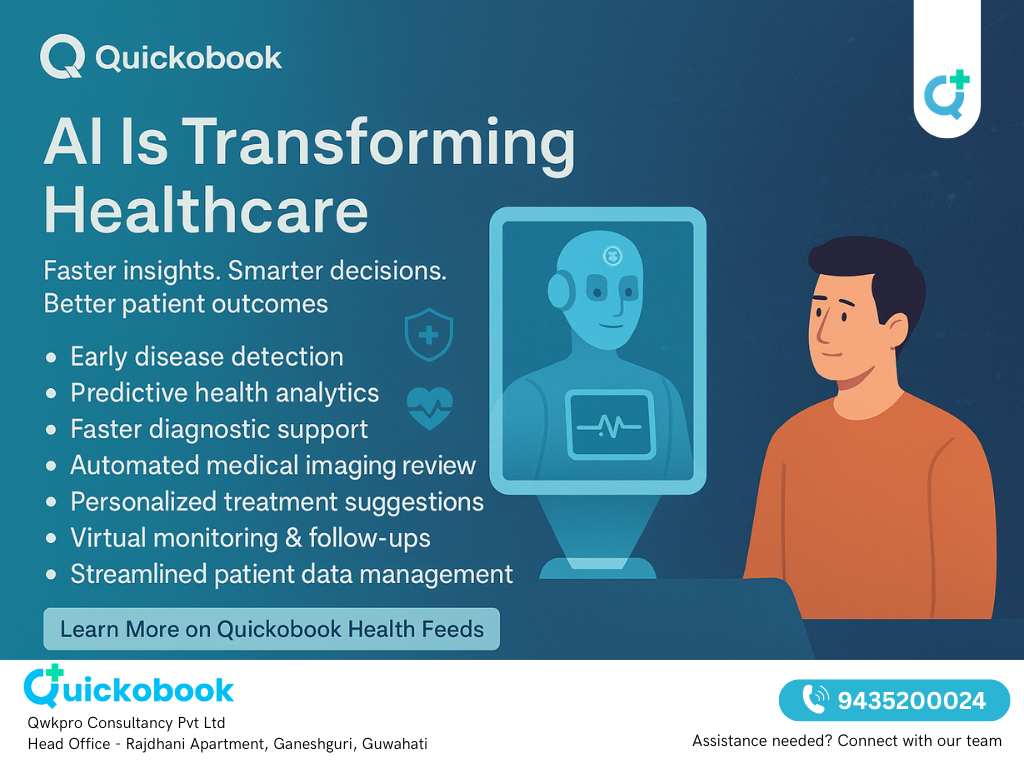Introduction
Artificial Intelligence (AI) is changing healthcare faster than any previous technology. From diagnosing diseases earlier than humans to predicting heart attacks with near-perfect accuracy, AI is becoming smarter, faster, and more capable every year.
And this has raised a big question:
Will AI replace your general physician?
The real answer: AI will not replace doctors completely, but it will replace many tasks your GP currently does—especially diagnosis, screening, documentation, monitoring, triage, and decision support.
In India, digital health adoption is accelerating because of telemedicine, online consultations, wearable trackers, and government initiatives like the Ayushman Bharat Digital Mission. General physicians are increasingly using AI to improve accuracy, save time, and deliver more personalized care.
Let’s explore the 7 ways AI is becoming powerful enough to take over major parts of your doctor’s role—and what that means for you.

1. AI Can Diagnose Diseases Faster Than Doctors
Overview
AI tools trained on millions of medical images and records can spot patterns that humans miss.
Examples
- AI reading X-rays, MRIs, and CT scans
- Skin cancer detection through image analysis
- ECG interpretation within seconds
Why It Matters
A GP may take time to interpret symptoms or reports. But an AI model can analyze them instantly, reducing errors and speeding up treatment.
Real-life Use
AI systems like Google’s DeepMind and IBM Watson detect early eye disease, lung infections, and cancers with high accuracy.
2. AI Predicts Diseases Before They Happen
Predictive Healthcare Is the Future of Digital Health
AI can scan your medical data—heart rate, sleep patterns, blood pressure, genetics—and calculate your risk for:
- Heart attack
- Stroke
- Diabetes
- Kidney failure
- Mental health disorders
How It Helps
A general physician usually identifies a disease after symptoms appear.
AI can identify it months or years earlier.
Imagine getting an alert:
“Your heart attack risk increased by 12%. Consider visiting your doctor.”
This is already happening through smart watches and health apps.
3. AI Replaces First-Level Doctor Evaluation (Triage)
AI Chatbots and Symptom Checkers
Tools like Ada, Babylon Health, and ChatGPT-based medical models can:
- Ask questions
- Understand symptoms
- Suggest likely conditions
- Recommend when to visit a doctor
Why It Matters
Instead of waiting hours in clinics, AI triage can guide you instantly.
What It Cannot Do
Examination, empathy, nuance.
This is where the human GP remains essential.
4. AI Monitors You 24/7—Something Doctors Can’t Do
Smart wearables are becoming your mini “digital general physicians”.
They Track:
- Heart rate
- Oxygen saturation
- Sleep cycles
- Stress
- Blood pressure
- Irregular heart rhythms
Why It Matters
If something goes wrong, AI alerts you before it becomes serious.
Example:
Your watch detects atrial fibrillation → notifies your doctor → prevents a stroke.
Doctors cannot monitor you all day.
AI can.

5. AI Writes Reports, Notes, and Medical Documents
Doctors spend nearly 40% of their time on paperwork.
AI now handles:
- OPD summaries
- Prescriptions (draft)
- Health reports
- Follow-up instructions
- Electronic health records (EHRs)
Benefits
- Less doctor fatigue
- More time for patients
- Accurate documentation
- Reduced errors
Digital health systems like ABDM in India are integrating AI to automate clinic workflows.
6. AI Helps Doctors Decide Better With Data (Decision Support)
AI does not replace doctors here—but it makes them smarter.
AI Helps With:
- Choosing the right medicine
- Predicting side effects
- Drug interactions
- Reading lab reports
- Identifying rare conditions
Why It Matters
Even the best general physicians cannot memorize every medical guideline or drug interaction.
AI decision support systems do this instantly.
This improves accuracy, safety, and personalized treatment.
READ ALSO: Why Hepatitis A Deserves A Place In India's Universal Immunisation Programme
7. AI-Powered Virtual Doctors & Digital Clinics
Virtual AI doctors can:
- Conduct video-like consultations
- Ask detailed questions
- Suggest early management
- Maintain health records
- Advise lifestyle changes
Where They Are Used
- Remote villages
- Emergency triage
- Night-time medical assistance
- Chronic disease monitoring
Will They Replace Human Doctors?
They replace basic tasks, not the doctor.
Humans want compassion, reassurance, and personalized care—AI cannot fully mimic that.
Will AI Completely Replace General Physicians?
Short Answer: No.
Long Answer: AI will replace 40–60% of tasks—but not the doctor.
Here’s what AI replaces:
Symptom checking
Initial diagnosis
Vital tracking
Report analysis
Predictive analytics
Documentation
Administrative tasks
Here’s what AI cannot replace:
Empathy
Physical examination
Clinical judgment
Experience
Human touch
Counseling
Complex medical decisions
Doctors who use AI will replace those who don’t.
Benefits of AI + General Physician Partnership
- Faster diagnosis
- Lower healthcare costs
- Error reduction
- 24/7 monitoring
- Personalized treatment
- Better chronic disease management
- Improved mental health support
Artificial intelligence will not replace your doctor—it will upgrade your doctor.
Risks & Limitations of AI in Healthcare
- Misdiagnosis due to poor data
- Privacy & security risks
- Overdependence on technology
- Lack of emotional understanding
- Bias in AI algorithms
- Need for human supervision
This is why the GP remains central.
Conclusion
AI is revolutionizing digital health.
It’s faster, smarter, and more accurate every day. But instead of replacing general physicians, AI will work with them to deliver better care.
The future of healthcare in India is not “AI vs doctor”—
It is AI + Doctor = Better Health for All.
AI will enhance diagnosis, monitoring, decision-making, and patient experience.
Doctors will focus more on empathy, communication, and complex care while AI takes over the repetitive tasks.
A healthier, smarter future is coming—and your GP will still be part of it.

Quickobook CTA
Need a trusted general physician who uses the latest digital health tools?
Find verified GPs, book appointments, and access online consultations instantly on Quickobook.
???? Visit Quickobook and book your doctor today.
Disclaimer
This blog is for educational purposes only. It does not replace professional medical advice, diagnosis, or treatment. Always consult a qualified doctor for personal health concerns.
50 FAQs (Short, Simple, ≤3 sentences each)
- Will AI replace doctors completely?
No, AI will replace certain tasks but not the doctor’s role entirely. - Can AI diagnose diseases accurately?
Yes, AI can diagnose many conditions quickly, but a doctor confirms the final diagnosis. - Is AI safe for healthcare?
Yes, when supervised by medical professionals. - How does AI help general physicians?
It improves speed, accuracy, and decision-making. - Can AI read X-rays and scans?
Yes, often with higher accuracy than humans. - Does AI predict heart attacks?
AI can analyze ECG and lifestyle data to predict risk. - Can AI detect mental health problems?
It can identify early patterns of anxiety and depression. - Is AI used in Indian hospitals?
Yes, many hospitals use AI-based imaging and triage tools. - Will AI replace physical checkups?
No, physical exams require human doctors. - What is digital health?
Use of technology to monitor, diagnose, and manage health. - Can AI reduce treatment errors?
Yes, through data-driven recommendations. - Are AI chatbots reliable for symptoms?
They help in initial triage but are not final authorities. - Is AI faster than doctors?
AI processes data instantly, making diagnosis quicker. - Does AI store my health data?
Only if connected to digital health systems. - Are AI-based health apps trustworthy?
Trusted apps backed by doctors are generally safe. - Can AI track blood pressure?
Yes, through smart devices. - Can AI replace laboratory tests?
No, but it can interpret results faster. - How does AI help in diabetes management?
It monitors sugar trends and predicts complications. - Can AI detect cancer early?
Yes, through imaging and pattern recognition. - Does AI help in pregnancy care?
AI monitors fetal health and maternal risk factors. - Can AI analyze ECG reports?
Yes, within seconds. - Is AI useful for remote villages?
Very, especially in areas with fewer doctors. - Does AI help reduce hospital costs?
Yes, by reducing unnecessary tests and errors. - Can AI detect infections?
Yes, especially lung and eye infections. - Does AI replace mental health therapy?
No, but it provides initial support. - Will AI change the role of GPs?
Yes, making their work more efficient. - Does AI predict medicine side effects?
Yes, by cross-checking medical records. - Can AI monitor sleep?
Yes, using smart wearables. - Is AI used for weight management?
Yes, through nutrition and activity algorithms. - How accurate is AI diagnosis?
Usually high, but a doctor must verify. - Can AI help detect kidney problems?
Yes, through lab pattern analysis. - Does AI help in emergencies?
Yes, for fast triage and alerts. - What are AI-based virtual doctors?
Software tools that mimic doctor consultations. - Can AI help with skin diseases?
Yes, through image analysis. - Does AI improve mental health awareness?
Yes, through stress tracking and early alerts. - How does AI benefit senior citizens?
Through fall detection and health monitoring. - Is AI helpful for chronic conditions?
Extremely, due to continuous tracking. - Will AI replace specialists?
No, but it will support them. - Is AI costly?
Digital tools are becoming affordable in India. - Can AI detect hormonal imbalance?
It can analyze patterns but a doctor confirms. - Can AI be wrong?
Yes, which is why medical supervision is essential. - Does AI support telemedicine?
Yes, by automating triage and reports. - Can AI scan your health records?
Yes, to detect patterns and risks. - Does AI help in blood test interpretation?
Yes, within seconds. - Does AI track menstrual cycles?
Yes, through apps and wearable data. - Can AI predict mental burnout?
Yes, using behavioral data. - Does AI help reduce doctor workload?
Yes, by automating administrative tasks. - How does AI make healthcare faster?
Through automation and instant analysis. - What is the future of AI in healthcare?
Smarter diagnosis, personalized treatment, and remote monitoring. - Should I trust AI without a doctor?
No, always combine AI tools with professional medical advice.









Comments (0)
No comments yet. Be the first to share your thoughts!
Leave a Comment